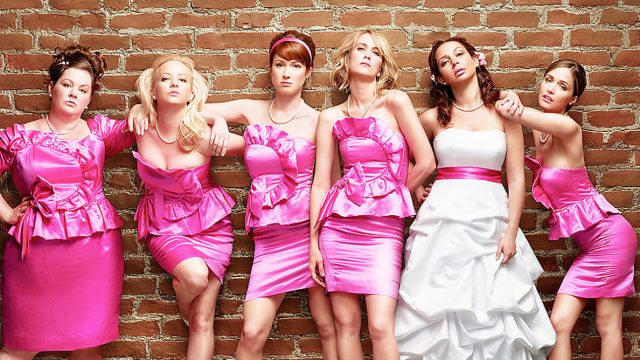The first time we see Kristen Wiig and Maya Rudolph together in Bridesmaids, they’re sneaking into an outdoor fitness class. “It’s only twelve bucks,” the annoyed instructor yells at them when they’re caught out), but it’s clear that the thrill of getting away with something is half the fun. Rudolph and Wiig have great chemistry right from the jump, and it gets Bridesmaids off to a great start. We understand why these women are friends, how precious that friendship is, and why, as the movie continues, Wiig becomes increasingly afraid she’ll lose it.
Bridesmaids has kind of a weird reputation, in part because it was part of the “raunchy adult comedy” wave, with its marketing prominently featuring Maya Rudolph shitting in the street. And it does, in fact, feature a scene where Maya Rudolph has to shit in the street. But it’s also very much a film about finding yourself when you’ve gotten lost, and how complicated and thorny friendships can be, especially those that started long before you became who you are.
If you haven’t seen it, Bridesmaids is a character piece about Kristen Wiig’s Annie as much as anything. She’d lost her dream business (never open a bakery during a recession, we learn), is stuck in a dead-end job she hates and isn’t particularly good at, and her one romantic entanglement is with a narcissist who is incredibly bad at sex and insists on keeping things casual. When her childhood best friend gets married, it sends Wiig into a tailspin of insecurity. Chaos ensues, some of it due to bad luck (the food poisoning that leads to the street scene), some of it due to Wiig’s jealousy of Rudolph’s potential new best friend, the absurdly pretty and rich Rose Byrne. It all works out eventually, of course, but Bridesmaids doesn’t make it easy. Wiig and Annie Mumolo co-wrote the script, and they refuse to reduce the conflict between Wiig, Byrne and eventually Rudolph to any sort of “bitches, amirite?” simplicity. Wiig is so frozen by her own failure she can’t even get her brake lights fixed. We get less time with Byrne, but she too is being controlled by her own insecurities. The rest of the women in the cast don’t get caught up in the game the way they might in a more predictable movie; they have their own stuff going on. (As befits a goofy comedy, there’s not a “normal” person in the cast, and Bridesmaids is better for it.)
Bridesmaids may have given us women shitting in the street, but it took The Help to give us women literally eating shit. The Help is a drama (or dramedy, depending on who you ask), but it goes for laughs as broad as Bridesmaids’, treating that contaminated pie like the absolute height of hilarity. The rest of the movie is, as they say, not much better. Director-screenwriter Tate Taylor creates a cast of characters only slightly more dimensional than paper dolls. Most of the white women are insecure, grasping, petty tyrants; the Black maids are allowed a greater range of emotion, but are still all too often thrust into the limited role of frustrated martyrs.
The only relationship that feels genuine is between Jessica Chastain, another isolated rich woman (there really was something in the air in 2011) and Octavia Spencer, both relative outsiders who find companionship by breaking their society’s rules. The Help tries to say something about how white women in the South — who’ve lost power over their own lives to the patriarchy around them — exercise their frustration by becoming petty tyrants to the people they do have power over, but the movie’s not deft enough to make much of a case. A better writer (perhaps someone who wasn’t male, and wasn’t white…just a thought) might have pulled at the threads of the Chastain-Spencer relationship and created something more real. But maybe they would have been wiser still and skipped the project altogether.
In the end, it’s the lowbrow comedy with public shitting that honors its characters and allows women to be real and complicated. Go figure.

